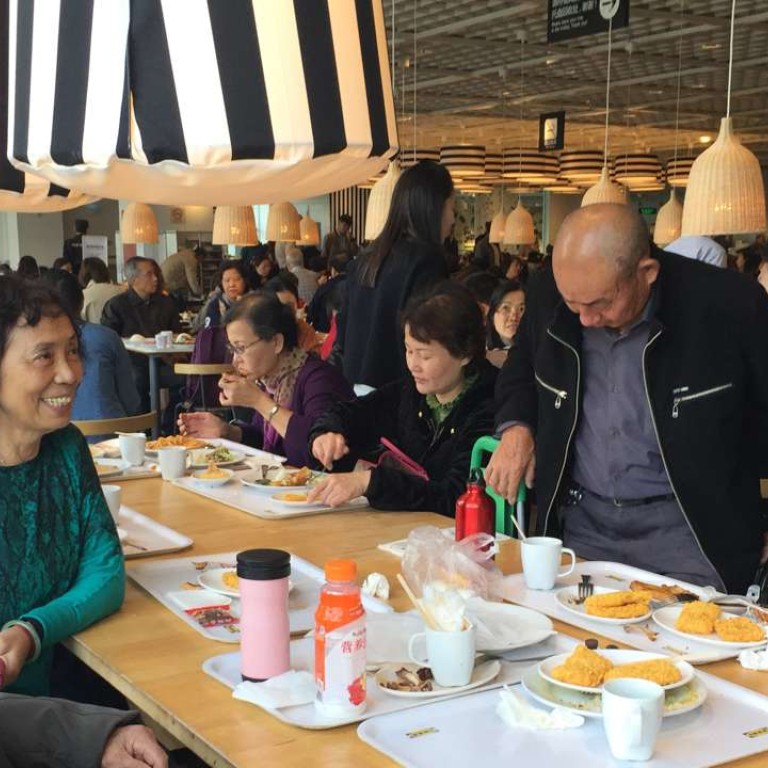
Ikea restaurant becomes home away from home for Shanghai’s elderly
Shanghai store’s decision to clamp down on pensioners meeting in its restaurant highlights unmet social needs of city’s greying population
For almost a decade, hundreds of senior citizens flocked every Tuesday and Thursday to the Xuhui district outlet in Shanghai of Swedish furniture giant Ikea.
They gathered in the store’s restaurant to chat, taking up seats throughout the day but rarely buying anything from the menu.
They brought their own food and made the most of the bottomless cups of coffee. They took seats from genuine restaurant patrons and reportedly brawled.
But last month the company clamped down, announcing that the restaurant would only admit people who had bought food there.
The decision made international headlines and prompted a public debate about whether the social needs of the city’s rapidly ageing population were being addressed.
The greying of Shanghai’s population became noticeable in the late 1970s when at least 10 per cent of the residents were aged 60 or above.
By the end of last year, that proportion had risen to 30 per cent, or 4.36 million of the city’s 14.4 million permanent residents, according to the municipal statistics bureau. The rate is double the national average.
The ageing trend is only expected to continue.
Forecasters suggest there will be at least five million people aged over 60 in 2018 and 5.4 million in 2020. The number of octogenarians is also expected to rise, according to a blueprint on the causes of ageing released by the municipal government in September.
Zhang Xiaoyi, a public management professor at Shanghai Jiao Tong University, said the city was focused on meeting the physical needs of the elderly but the authorities tended to neglect their spiritual needs, an issue brought to the surface by the gatherings at Ikea.
[The elderly] have material needs but also want to socialise and enjoy leisure activities
“The conflict between Ikea and Shanghai’s senior citizens suggests that the elderly have multilayered demands,” Zhang said. “They have material needs but also want to socialise and enjoy leisure activities.”
But Shanghai, like many other mainland cities, is scrambling to meet even the basic needs for care, struggling to build affordable nursing homes and hire auxiliary workers to take care of elderly residents.

Although there are 6.7 million beds at elderly residential centres across the mainland – meeting the central government’s target of providing 30 beds for every 1,000 old people – the cost of most of these beds is beyond the means of typical pensioners.
Only a small number of government-run nursing homes charge fees that are considered affordable by the general public, but their waiting lists are so long that many old people have to wait for years before can take up places.
To help with social activities, Shanghai authorities have built hundreds of community education institutions, and thousands of sports venues and cultural activity centres.
But 72-year-old widow Zhou Qinli said she preferred the warmth of the furniture store.
I think there is only one place in Shanghai – the Ikea restaurant – that provides a convenient location and cosy indoor environment for us old people to get together and chat
“I think there is only one place in Shanghai – the Ikea restaurant – that provides a convenient location and cosy indoor environment for us old people to get together and chat,” Zhou said.
She said she went to Ikea once a week over the past few years to meet dozens of her elderly friends.
Zhou said they did not like visiting parks because gatherings held outside were often affected by the weather.
People could stay at other restaurants, such as KFC or McDonald’s, without buying food but the outlets were are not as big as Ikea’s restaurant.
Some people have continued to meet at the furniture store since the new rule on food came in, paying about 10 yuan (HK$11.5)for a bread item and then sitting there the whole day.
Zhou said she needed to go out to meet her friends because she had nothing else to do and nobody to talk to at home.
“I don’t like watching TV and I think it will also hurt my eyes,” she said. “If I don’t have any [social] activities, I will develop Alzheimer’s disease.”
She has been single for the past 20 years since the death of her husband. Two of her three children lived abroad and the remaining one was so busy with his job that he returned home late at night, she said.
“No one understands the spiritual distress of us old people,” Zhou said.
Only the elderly understand each other – that it’s a joyful occasion for us to get together
“Only the elderly understand each other – that it’s a joyful occasion for us to get together. We talk about a lot of things, including what medicines to take when we are sick.”
Another Shanghai resident Bao Shuying, 68, said the authorities should build more indoor venues and offer a greater variety of activities for pensioners to enjoy during their spare time.
“We don’t want to pay [for a place to meet],” she said. “We don’t have large pensions and we have been living frugally life for our whole life.”
Ren Yuan, a demographer at Shanghai’s Fudan University, said the country’s ageing population was posing tough challenges for the central government.
The authorities were finding it difficult to provide services to match the various demands of the increasing number of elderly people. “The provision of public facilities where old people can relax and socialise is generally not included in urban planning,” he said.

